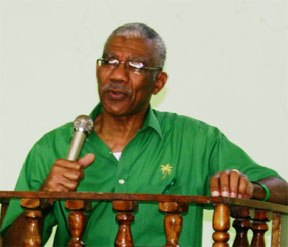Opposition leader David Granger yesterday de-clared that the main opposition APNU will not approve of the anti-money laundering amendment bill unless other bills already passed by the opposition are assented to.
“We will certainly not approve the money laundering bill unless the President assents to the bills that were passed,” Granger told a news conference yesterday.
Citing insufficient legislation and poor institutional capabilities, APNU and the AFC refused

to pass the amendment bill in the National Assembly before the deadline last Novem-ber. As a result, CFATF called on its members to take precautionary measures. Guyana was then given until May this year to pass the legislation, although Attorney General Anil Nandlall says that the Guyana can be called to a Financial Action Task Force (FATF) plenary this month.
Granger earlier this week announced that APNU would withhold support from certain government bills in the National Assembly unless it gets an assurance from the executive that bills already passed would receive presidential assent and those already enacted would be operationalised.
In a statement issued on Wednesday, he registered his dismay that President Donald Ramotar has not assented to four bills passed by the National Assembly, including three opposition bills, the Fiscal Management and Accountability (Amend-ment) Bill 2012, the Fiscal Management and Ac-countability (Amendment) Bill 2013 and the Constitution (Amendment) Bill 2013. The bills were passed by the combined opposition parties, using their one-seat majority in the National Assembly and over concerns by government over their constitutionality. Ramotar has said that he would not assent to bills passed without executive input. The remaining bill, the Local Government (Amendment) Bill 2012, according to Ramotar, is also unconstitutional.
However, Granger argued that it was very surprising that a bill that was vetted and approved was deemed “unconstitutional” by the president.
With regards to APNU getting assistance to draft legislation, Granger stated that the coalition has made contact with several experienced lawyers because it has been denied the services of the parliamentary counsel. “There is one person Cecil Dhurjon but he is located in the chambers of the AG [Attorney General]. So although he is frequently at Parliament he is not on a day to day basis available to the opposition. We are satisfied that because of his presence, the bills that come before the National Assembly have been thoroughly vetted. It is very surprising that after a bill is vetted and approved, the President could say that it is unconstitutional,” he, however, stressed.
In his earlier statement, Granger said APNU had decided to withhold support of certain bills brought to the National Assembly by the Executive until and unless the executive gives an assurance that bills already passed by the National Assembly will be assented to, or have their re-submission and passage facilitated in the National Assembly. The executive, he said too, would also have to give an assurance that the bills to which the President has already assented would be operationalised without delay.




